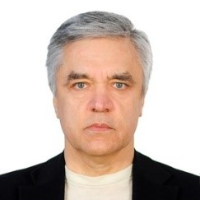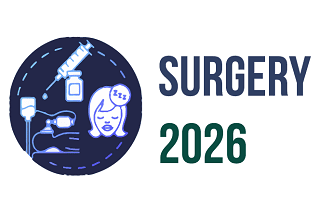4th International Conference on
Surgery and Anesthesia
November 26-27, 2026 | Dubai, UAE

Surgery 2026

Moscow State University, Russia
Abstract:
A new systems
approach to diseased states and wellness result in a new branch in the
healthcare services, namely, personalized and precision medicine (PPM). The
latter is a radically new trend which utilizes each patient’s individual genomic
landscapes to create a biomarker-based targeted therapy and rehabilitative
protocol.To achieve
the implementation of PPM concept into the daily clinical and post-operative
rehabilitation-related practice, it is necessary to create a fundamentally new
strategy making precision surgery (PS) and PS-associated personalized
rehabilitation (PR) (PS-PR) as a new approach to health care that customizing
patients’ medical treatment according to their own genetic information. This
new combinatorial and evidence-based approach is the result of increased
knowledge of the human genome and phenome and ways this information can be
applied by surgeons and physicians in the medical and surgical management of
their patients. In this sense, a patient’s genotype can yield important
information concerning disease systems-related susceptibility and the
effectiveness of medications, therefore guiding specific, targeted imaging, treatment
and rehabilitative therapies.In this
sense, identifying drug-response phenotypes by examining interactions between
phenotypes and sepsis therapies is a priority to optimize clinical trials.
Adaptive trials (response-adaptive randomization) should be performed if endophenotypes
are not available or when multiple endophenotypes (identified by measuring OMICS
markers) are present. Use of electronic health records should be explored to
identify such endophenotypes, whose replication in multiple datasets require
big data with harmonization across multiple sites to determine the robustness
of such endophenotypes for sepsis prognosis.The remarkable
progress in the field of sepsis and its complications can be attributed to the
latest advances in OMIC-technologies and sepsis modeling, together with a
better understanding of the immunopathology, biology and epidemiology of sepsis
syndrome. Experimental models of sepsis can provide a clear understanding the pathophysiology
of sepsis and confirm its evolution to septic shock. The focus
of the biodesign-driven translational research and applications is nowadays on
the interplay between therapies, pathogens, and the host. Regarding the
pathogen-inducer, microbiologic diagnostic approaches are discussed, as well as
multi-targeted (combinatorial) treatment, since sepsis is certainly the sum of
multiple host-microbial interactions.Other
topics include the disruption of host immune system and the use of specific biomarkers
in sepsis management and patient stratification. Previous attempts at reducing
mortality with multi-cytokine mediation have failed to reduce mortality across
all patient parameterizations and motivated us to investigate whether adaptive,
personalized multi-cytokine mediation can control the trajectory of sepsis and
lower patient mortality. But the other approaches focusing on adaptive and
personalized multi-cytokine mediation therapy, could be a promising future for
treating sepsis.Among the
latest innovations in the field, for instance, ImmunoSep, illustrating
the advanced innovations in personalized immunotherapy and developing a
next-generation theranostics platform for the personalized targeted immunotherapy,
aims at significantly improving the treatment outcome of sepsis in individual
patients.Finally, PPM
in sepsis entails making an early and accurate microbiologic diagnosis,
determining the host immune response signature and assessing individual
response to treatment, in order to tailor therapy to the specific needs of each
individual patient. So, sepsis requires the physician to accurately place the
patient in the appropriate cohort that is relevant to the test being used and
that is designed for the individual patient, or at least for a homogeneous
group of patients who share specific characteristics. In this sense, PPM and
its unique resources are likely to be harder to use in sepsis than in some
other clinical settings.
We are offering a new
view on the management of PPM in sepsis-related precision surgery associated
with personalized rehabilitation which, to our mind, strongly stresses the need
to discuss the management of PS-PR on an individual basis in an
interdisciplinary context, in order to offer the best possible surgical,
therapeutic and rehabilitative approach. In this sense, the infrastructure of the
Center
for Precision Surgery & Personalized Rehabilitation (CPSPR)
should have, at least, four essential components: 1) genomic/molecular data
acquisition and storage, 2) integration of genomic diagnostic testing and targeted
imaging, 3) research focused on functional genomic targets, and 4) development
and informed use of targeted therapies of actionable genes. Moving forward,
clear and centralized consensus on actionable genes is needed.
Biography:
Sergey Suchkov was born in the City of Astrakhan, Russia, in a family of dynasty medical doctors. In 1980, graduated from Astrakhan State Medical University and was awarded with MD. In 1985, Suchkov maintained his PhD as a PhD student of the I.M. Sechenov Moscow Medical Academy and Institute of Medical Enzymology. In 2001, Suchkov maintained his Doctor Degree at the National Institute of Immunology, Russia.
From 1989 through 1995, Dr Suchkov was being a Head of the Lab of Clinical Immunology, Helmholtz Eye Research Institute in Moscow. From 1995 through 2004 - a Chair of the Dept for Clinical Immunology, Moscow Clinical Research Institute (MONIKI). In 1993-1996, Dr Suchkov was a Secretary-in-Chief of the Editorial Board, Biomedical Science, an international journal published jointly by the USSR Academy of Sciences and the Royal Society of Chemistry, UK.
